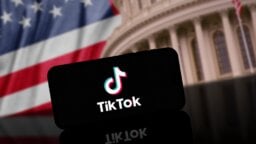Canada’s federal government has ordered TikTok to shut down its Canadian operations – although Canadians will continue to have access to the platform.
The country’s Innovation, Science and Industry Minister, François-Philippe Champagne, said in a statement issued on Wednesday (November 6) that the government had ordered TikTok Technology Canada Ltd, to “wind up” its operations over “specific national security risks” that had been identified during a year-long review of TikTok’s Canadian operations.
The decision to order the shutdown was made on advice from the security and intelligence community, Champagne said.
“The government is not blocking Canadians’ access to the TikTok application or their ability to create content. The decision to use a social media application or platform is a personal choice,” Champagne said.
TikTok Technology Canada mostly deals with ad sales and marketing, and has offices in Toronto and Vancouver, the National Post reported.
“Shutting down TikTok’s Canadian offices and destroying hundreds of well-paying local jobs is not in anyone’s best interest, and today’s shutdown order will do just that,” TikTok said in a response published Thursday.
“We will challenge this order in court. The TikTok platform will remain available for creators to find an audience, explore new interests and for businesses to thrive.”
“The government is not blocking Canadians’ access to the TikTok application or their ability to create content. The decision to use a social media application or platform is a personal choice.”
François-Philippe Champagne, Canada Minister of Innovation, Science and Industry
This will not be TikTok’s first legal challenge to a proposed ban. The Canadian shutdown order comes in the wake of a new US law that requires TikTok parent company ByteDance to sell TikTok’s US operations, or effectively face a ban on the app as of January 2025.
TikTok has challenged the law in US federal court, arguing it’s an unconstitutional violation of freedom of speech.
The US law’s status is uncertain in the wake of Donald Trump’s victory in the presidential race this week. While Trump had originally supported a ban on TikTok during his first term as president, he came out against the new divest-or-ban law during the campaign this year.
Trump joined TikTok earlier this year, rapidly gaining 13.7 million followers.
The divest-or-ban law comes into effect the same month that Trump will be inaugurated.
TikTok has long been suspected of offering the Chinese government backdoor access to users’ data. As a China-headquartered company, ByteDance is required to share data with the government in Beijing upon request.
TikTok has long denied that it has shared data with Beijing, and says it is shifting US users’ data to servers inside the US. TikTok has previously said that Canadians’ data is stored on servers in Malaysia, Singapore and the US, according to the Globe and Mail.
“Shutting down TikTok’s Canadian offices and destroying hundreds of well-paying local jobs is not in anyone’s best interest, and today’s shutdown order will do just that.”
TikTok
Canada’s decision to ban TikTok from operating as a business while allowing Canadians to use its services has been criticized by some media experts.
A media expert at Toronto Metropolitan University, interviewed by the Globe and Mail, called the decision “bizarre,” while Michael Geist, a prominent professor of law, tech, and e-commerce at the University of Ottawa, said the move could be counterproductive.
“There may well be good reasons to ban the app if it poses security and privacy risks that differ from those of other platforms, but banning the company rather than the app may actually make matters worse since the risks associated with the app will remain but the ability to hold the company accountable will be weakened,” Geist wrote on his blog.
Canada was among numerous Western countries that banned the TikTok app from government devices in 2023. Other governments that have implemented this restriction include the US, UK and European Union.Music Business Worldwide





